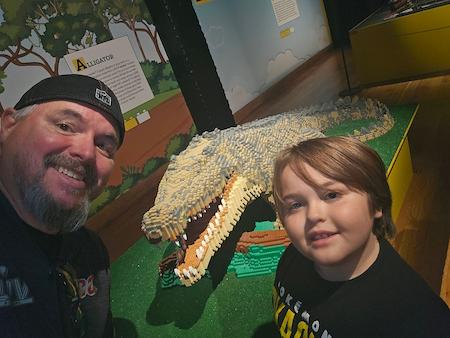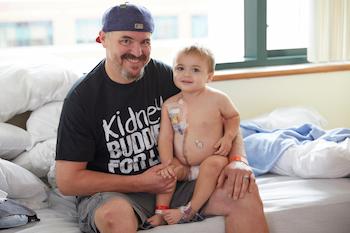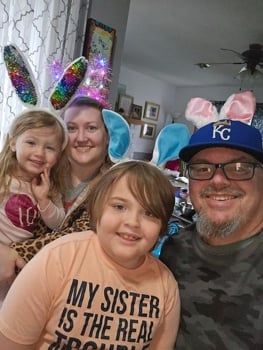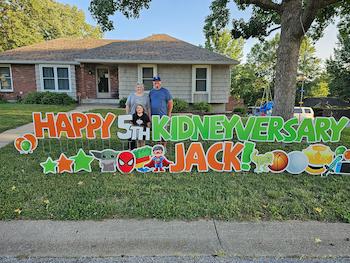Kidney Transplant: No Regrets
Dad reflects on donating a kidney to his son
Meet Jack and Geoff


There are 100,000+ people waiting for a kidney transplant in the United States...and many more potential donors who could give a kidney to someone in need. Transplant outcomes are much better when the kidney is from a living donor than someone who has passed away. But less than 30 percent of pediatric kidney transplants are made possible by living kidney donations from a matched relative or generous stranger.
Both Geoff Robinson and Jennifer Sauer wanted to donate a kidney to their son, Jack, whose story was featured on Inside Pediatrics in 2019. Jack’s kidneys were failing, and Geoff and Jen were performing dialysis at home to keep him alive. After going through the evaluation process (meetings and tests take one to two days, but the entire process can take two to three months), the team determined that Geoff would be the best option.
The Kidney Transplant Program at Children’s Mercy Kansas City educates the families of transplant candidates on living donation and performs multiple living-donation transplants each year. Many family members are willing, but donors need to have compatible blood and Human Leukocyte Antigens (HLA) types, in addition to meeting age and health requirements.
“Going into this, I really had no idea about any aspect of organ donation,” said Geoff. “I feel extremely lucky we were at Children’s Mercy because everyone was so calm and caring and explained everything that was happening.”

Geoff’s donation surgery took place at St. Luke’s Hospital of Kansas City. It was Geoff’s first surgery ever. “I would be lying if I said I had no worries going into this, but the staff at Children’s Mercy and St. Luke's made me feel comfortable,” said Geoff. “Every situation, both good and bad, raced through my mind leading up to donation day, but I forced myself to focus on the positive.” positive. ”
The two surgical teams worked together to get Geoff’s kidney transferred to Jack as quickly as possible. Both surgeries went well, and Geoff was able to reunite with Jack several days later during an emotional hospital visit. By the time Jack was ready to come home, Geoff was fully recovered and ready for the family’s transition to post-transplant life.
Remarkably, giving a kidney generally has a minimal impact on the donor’s health. Geoff doesn’t require any post-donation medication, and he hasn’t had any health issues related to the surgery or to his own single-kidney status. A kidney team monitored Geoff’s labs for two years after the surgery, but now his care is handled by his primary care physician and his cardiologist. Jack’s post-transplant care includes immunosuppressive drugs, close attention to hydration, and some lifestyle restrictions (no tackle football, for example). The family celebrates Jack’s “Kidney-versary” with a big party every year.

“To this day, it is still very surreal to imagine my kidney inside Jack,” said Geoff. “I have not regretted my decision one single time. If I could give the only kidney l have left to save Jack again, I would. It has been the most rewarding feeling to be the one to save someone else.”
